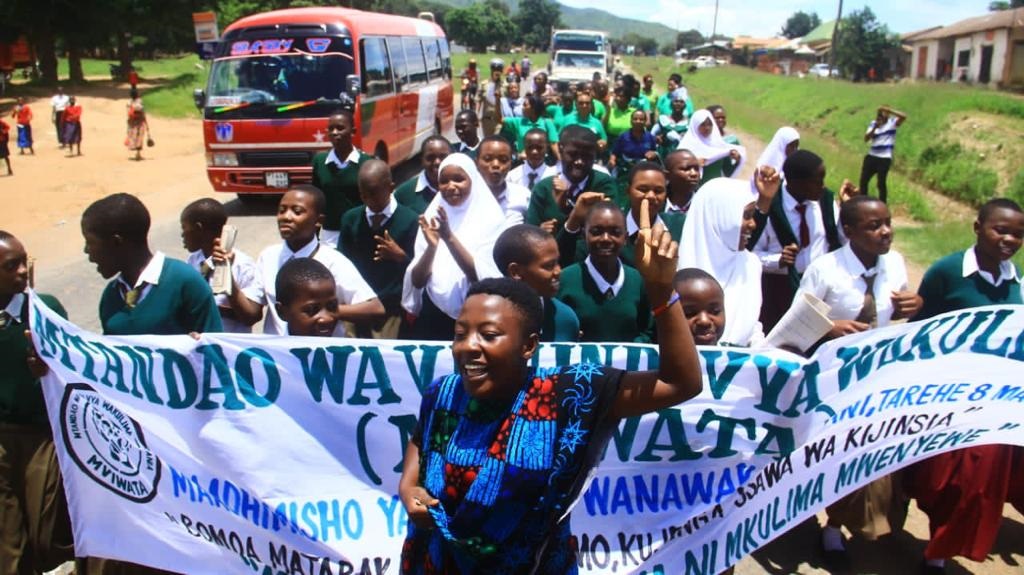Civil Society Organizations and Indigenous Peoples call for a world free of sexual and gender-based violence and discrimination of any kind to achieve food security and nutrition for all
27 April 2022, Rome, Italy: In the context of the UN Committee on World Food Security (CFS) process of negotiations on the Voluntary Guidelines on Gender Equality and Women’s and Girls’ Empowerment in the context of Food Security and Nutrition which starts in May, representatives from civil society organizations and Indigenous Peoples highlighted the urgency to achieve strong and inclusive Voluntary Guidelines that can eradicate sexual and gender- based violence and discrimination in any kind to achieve food security and nutrition for all, during a public briefing.
Women’s, girls’ and LGBQTI persons’ rights are indivisible and interdependent with their Right to Food, to health, to land and other natural resources, to water, to decent work and employment and to self-determination. In this sense, speakers from the CSIPM shared experiences that show the long way to go to ensure that gender-based inequalities and discrimination are no longer a limiting factor to achieve the Right to Food, and how key actions could tackle the current scenario.
“After the experience from the COVID-19 crisis, the time is NOW to put in place clear public policies, instruments, and frameworks against sexual gender-based violence and discrimination. There is an urgency to address structural violence created by the current economic system, by war, conflict , occupations , and the current climate crisis, to ensure the right to food for these communities who are severely affected.” explained Glorene Das, executive director at Tenaganita, member of Asian Rural Women ‘s Coalition, and co-coordinator of the CSIPM Women and Gender Diversities Working Group.
The Voluntary Guidelines must also consider the obstacles faced by women living in occupied territories and under particular land tenure regimes, and how these impede the realization of their right to food as well as leaving unrecognized the role they play in food systems, as expressed by Souad Mahmoud from the World March of Women, who added “in a context of growing inequalities, access to key resources such as water, land, forests, fishing grounds and rangelands are targets of human rights violations for women and peoples.”
One of the core objectives of the guidelines, as expressed in the draft for negotiations, is to support Member States and other actors to eradicate hunger, food insecurity and all forms of malnutrition. In this sense, promoting and protecting locally-based food systems and territorial markets is key to achieve this goal. In the words of Gertrude Kenyangi from Support for Women in Agriculture and Environment in Uganda: “To ensure women’s economic empowerment, the governance of food systems should be human rights based. Food systems cannot continue to be reshaped to serve private profits, nor can they be reshaped to focus on productivity alone… Territorial markets must be protected from being flooded with imported food stuffs especially in situations of conflict, political instability and occupation.”
Intersectionality is key to step-up against racism and to address multiple and intersecting forms of discrimination due to caste, ethnicity, age, social class, religion, gender identity, sexual orientation, migration status and disabilities that deny women, girls and LGBQTI persons’ Right to Food.
As Vivian Motta from the Brazilian Association for Agroecology shared, racism is historically and negatively impacting the lives of racialized women, in response “Women are coming together in collectives of struggle, occupying the spaces for transformation, fighting to change the current government and State for one that supports women, we want to build a country and territory that reproduces life and that recognizes women as important subjects and our work is fundamental for the protection of society. The society that we want values diversity and women and understands that women’s work is essential for its permanence.»
Furthermore, Paula Gioia from La Via Campesina, expressed: “Worldwide LGBTIQ individuals remain often marginalized and have their political and civil rights denied, as well as their economic, social and cultural rights. Structural discrimination leads many of them to live in a surrounding of social exclusion in which basic rights such as food, housing and life are not guaranteed.” and called for the inclusion and explicit recognition of Gender Diversities in the Voluntary Guidelines.
Speakers expressed clear demands that should be addressed in the Voluntary Guidelines on Gender Equality and Women’s and Girls’ Empowerment in the context of Food Security and Nutrition, if these want to have a real impact on the lives of people in the territories:
- A world free from sexual and gender-based violence and discrimination of any kind.
- Intersectionality perspective
- A fair, sustainable food system centered on the realization of human rights, with agroecology at the heart of our daily work and lives.
- Guarantee and protection to the right to land and access to water and natural resources for women, girls and LGBTQI people of different constituencies.
- Promote and encourage locally based food systems and territorial markets.
- Inclusion and explicit recognition of Gender diversities.
The first round of negotiations on the Voluntary Guidelines will be held from May 4 through 6. Find here the calendar of the process and the draft for negotiations in six different languages.

